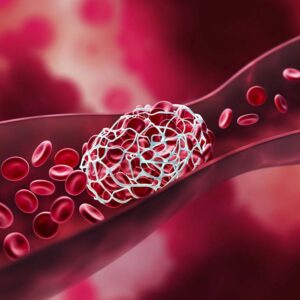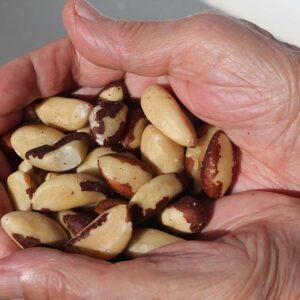
This Spice Just CURED Diabetes
Dear Living Well Daily Reader,
It’s no secret that inflammation is the root cause of all disease.
And it seems like every day, science discovers a new way inflammation turns you into a sitting duck for everything from cancer to diabetes.
But as it turns out, there’s an easy way to shield your body from the effects of inflammation.
You see, researchers from the University of Connecticut have just found that a simple food can stop inflammation in its tracks.
And believe it or not — it may even be powerful enough to cure diabetes.
I’m talking about chili peppers.
And these spicy plants have been shown in the past to do everything from extending your life to fighting tough cancers.
But just this week, University of Connecticut scientists published a study that found chili peppers can dramatically reduce inflammation.
In the study, researchers fed capsaicin, a chemical found in chili peppers, to mice.
Once they realized it reduced gut inflammation, they decided to take a closer look at capsaicin’s effects on other parts of the body.
And what they found was incredible…
The capsaicin was so powerful at reducing inflammation in the pancreas that it cured the mice of Type 1 diabetes.
Experts believe capsaicin is so effective because it binds itself to special receptors called TRPV1. This creates a compound called anandamide, which helped lower the mice’s immune response and stop inflammation.
Anandamide reacts with other immune cells that affect the pancreas and helps stop the reactions that cause diabetes.
You can get more capsaicin in your diet by adding chili peppers or hot sauce to your favorite foods.
Can’t handle the heat?
No problem.
You can add more capsaicin to your diet through supplements. Cayenne pepper is loaded with capsaicin, and you can buy it through natural health retailers for about $6 a month.
Live well,

Natalie Moore
Managing editor, Living Well Daily
Ed. Note: Please send your feedback: feedback@livingwelldaily.com – and click here to like us on Facebook.
Sources
[1] Chili peppers and marijuana calm the gut
Written By Natalie Moore
Natalie Moore is a dedicated health researcher with a passion for finding healthy, natural, and science-based solutions. After a decade of direct healthcare experience in western and natural medicine, she was involved in public health research before joining Living Well Daily.
View More Free Articles
Take the SHORTER Path to Dramatically Better Health
Are you tired of fitness gurus preaching the virtues of 5 AM workouts and pushing Olympic-level training regimens? Their narrative can feel exhausting and entirely unattainable. But before you toss in the towel completely, I’ve got news that might just put a spring back into your step. A groundbreaking new study reveals that the key...
Unexpected Perks of Your Coffee Habit Revealed!
We all know that the first cup of coffee in the morning can FEEL like a lifesaver. But what if it might actually BE saving your life? A groundbreaking new study suggests that your daily coffee habit could be protecting you from not just one but multiple chronic diseases. Let’s pour over this fascinating research…...
The TRUTH About Diabetes Drugs and Brain Aging
You’ve probably seen the gushing headlines… Most say something like, “Common diabetes drug protects the brain against aging!” And let’s face it, that sounds fantastic. After all, who doesn’t want to keep their brain young and in tip-top shape? The headlines refer to the results of a new study that suggests the widely prescribed type...
Hidden Smartphone Danger Puts You at Risk
Remember when we thought cell phones were just something for young folks to obsess over? Back when we were convinced they were nothing more than a passing fad? Well, times certainly have changed. Now, most people… including many of us older folks… have jumped on the smartphone bandwagon. Heck, some of us are practically as...
Preserve Your Mobility with “Agile Aging” Exercises
Aging has a way of humbling us. You lose hair where you want to keep it—and often end up growing it where you don’t. With every passing year, your eyesight fades, and your waistline expands. And as your once quick pace begins to slow, you fear developing the dreaded “senior shuffle.” But here’s the thing....
Yes, Lazy Saturday Lie-Ins Can BOOST Your Health
Are you burning the midnight oil during the week and catching up on sleep on weekends? Well, I’ve got some news that might help you feel less guilty about those lazy Saturday mornings. A new study suggests that weekend lie-ins might be doing far more than just helping you feel refreshed. Experts say they could...
Mailbag: 7 Hidden Culprits Behind Your Weight Gain
“Why am I gaining weight, even though I am watching what I am eating?” – Battling the Bulge Dear Battling, Gaining weight when you’re not trying to is frustrating. And it just gets worse as we age… often regardless of our diet. The truth is that various factors can promote weight gain even when you’re...
Popular Artificial Sweetener Linked to Dangerous Heart Risk
Remember when erythritol was the darling of the health food world? Well, this popular sugar substitute might not be as sweet a deal as we were led to believe… A shocking new study reveals a dark side to this widely used artificial sweetener. It turns out erythritol is associated with a dangerous—and even deadly—heart risk....
Cracking the Code on Chronic Inflammation
Inflammation and obesity are the evil tag team at the heart of nearly every major disease we face—from diabetes to obesity. What starts as a normal, healthy process to fend off dangerous invaders can quickly fan into the flames of chronic inflammation… and that includes in your gut. The trouble is almost no one has...
Dreaming of Better Sleep? Your Gut Holds the Key
Do you toss and turn at night? If so, you’re not alone. In fact, if you’re a senior over 65, you join nearly 17 percent of your peers who ALSO struggle with poor sleep quality. But science has uncovered a natural supplement that not only could help you catch more Z’s but can also give...









